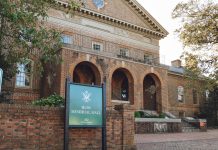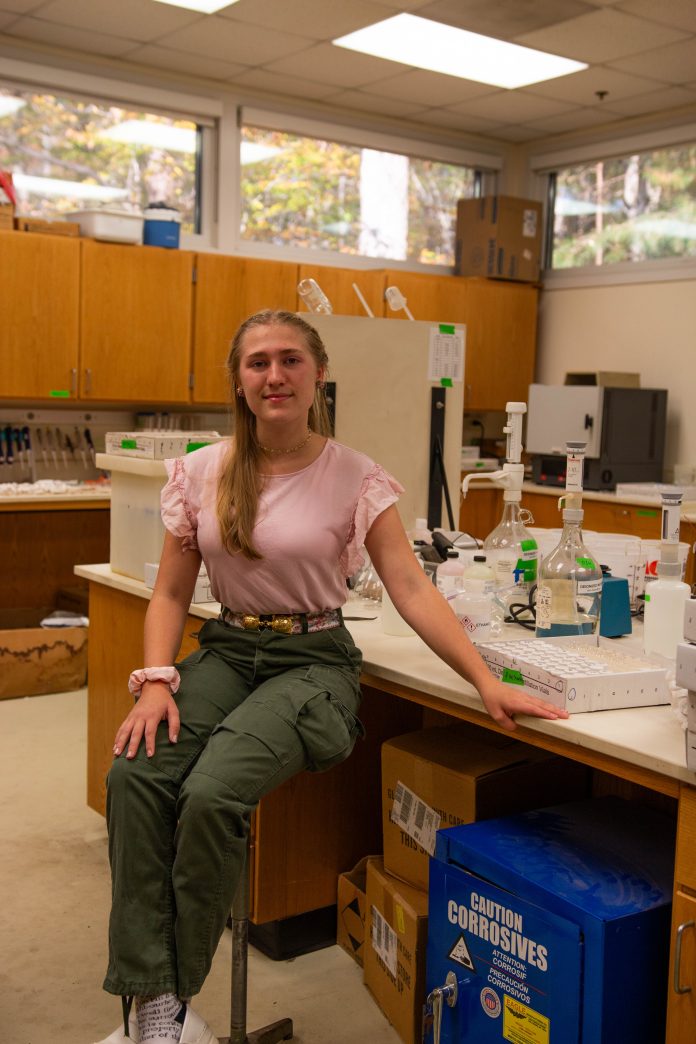Just three years into her degree at the College of William and Mary, Kaleea Korunka ’25 is already changing the world. While researching eviction, Korunka co-founded the Virginia Eviction Expungement Resource to support people who have been evicted and aid researchers like herself. Her research on microplastic pollution in Lake Matoaka, meanwhile, will position the College as a leading university in microplastic data collection. Driven by her desire to help others, Korunka also supports the community by working as a substitute teacher at her high school and organizing outreach events on chemistry and higher education with the College’s National Organization for the Professional Advancement of Black Chemists and Chemical Engineers.
Korunka, a self-described “military kid,” was born and raised in Hawaii, but has also lived in Virginia, Florida, Kansas, Kentucky and Tennessee. She attended high school in Virginia Beach, Va., where she currently lives when she is not at college. Korunka has long been what she describes as a “very artsy kid.” Korunka received weekly lessons in sewing, soldering and woodworking from her elementary school’s art teacher while her mother, who taught at the school, had conferences after classes ended for the day.
In college, Korunka continues to pursue crafts. She also enjoys running, baking and spending time with her sister and friends. At the same time, she is several years into two impactful research projects in science and sociology.
“I don’t know where it came from, but I’ve always had a weird obsession with plastics”
“I don’t know where it came from, but I’ve always had a weird obsession with plastics,” Korunka said.
Though she finds plastics magical, she is concerned by their overuse. Korunka was inspired to pursue a career researching plastics after taking a plastics class during her second semester at the College. She was later asked to present a group project she and two friends completed for that course at a conference on marine debris. The following spring, Korunka returned to the plastics class as a teaching assistant. During her time as a TA, Korunka began to consider self-designing a major on plastics.
Korunka received a Community Engagement Grant from the College to research microplastics this past summer. Korunka’s solo mission soon became a team of two after Director of the Environment program and professor of geology James “Jim” Kaste connected her with Seneca RiceWoolf ’25, who was conducting similar research. Korunka hopes this past summer’s efforts, which she has since presented at multiple conferences, will be renewed long-term having now prepared a standardized procedure and an initial outlook on the College’s microplastic pollution. As the mission grows, Korunka hopes to train students to carry on her work.
Korunka attributes her long-held interest in eviction to her mother, who taught her about African American history and inequality in American society.
“My grandmother was able to pass, right?” Korunka said, noting her grandmother’s ability to pass as white while having African American heritage. “My mother always felt very disconnected from a very integral part of her culture. So when she went to school, she specialized in African American history, slavery, reconstruction and civil rights. And growing up as a result, I was very, very fortunate for that to be the history I learned.”
After Korunka and her mother listened to a podcast episode that discussed redlining, zoning and racist actions taken by the federal government, Korunka was inspired to take a class at the College on eviction taught by associate professor Caroline Hanley.
Korunka is a Sharpe Community Scholar, which funds grants for students’ summer research. When deciding her research focus, Korunka joined forces with Ye Xiao ’25, a fellow Sharpe Community Scholar, after the two spent winter break at Korunka’s home studying evictions and became close friends. Korunka and Xiao were able to streamline their data collection process thanks to a web scraping software Xiao developed for their project. The software allowed the pair to more efficiently locate the publicly available court data they needed.
“Collecting court data in Virginia is insanely difficult,” Korunka said. “It’s public data, but it’s not really public, if that makes sense, because it’s so difficult to access. So in the past, William and Mary students, it would take teams of ten of them, like, an entire school year to collect maybe a year of data. And that’s just a few fields of data like addresses, and maybe, like, a name or maybe a couple of other fields of data.”
Xiao and Korunka made many in-person court trips to collect relevant data such as addresses for their research.
“Initially, you’re not allowed to bring technology to court in Virginia, sowe would go in with our pieces of paper, and we would handwrite out every address to bring back to write up into the computer, and nd that’s what other William and Mary students had done in the past,” Korunka said. “And me and Ye were like, there has to be some way to improve this system, right? So hence [Ye] created the web scraper and we got to know those security guards really well because we were showing up every day, and at some point we were like, ‘Can we just please bring our computers? You know, we’re not going into the courtrooms.’ And they fully supported our mission. And they’re like, ‘Of course we know you, you’re awesome. You’re not going to do anything crazy.’ So they allowed us to bring in computers, so it made our process way quicker.”
Korunka was pleased with her and Xiao’s results.
“By the end of our first summer of doing this research, we collected two years of data, all 36 fields of data. And that was, like, in barely two months. And we had enough time to double check everything,” Korunka said.
In comparison, she said, previous teams five times Xiao and Korunka’s size may have collected around five fields of data over the course of a full academic year.
Korunka and Xiao hope to create an eviction lab that is on par with Princeton’s The Eviction Lab, which Korunka thinks is a necessity for Virginia.
“The Hampton Roads area is one of the hottest spots in Virginia,” Korunka said, emphasizing the potential to do even more than leading eviction labs. “It makes no sense for us not to have an eviction lab here. There’s one in Richmond. It’s amazing. Their website is absolutely brilliant. And we hope to be somewhat like that. We hope to be more a resource for people than just research. ’Cause I feel like research and outreach need to be together in everything. Research without outreach is meaningless, in my opinion. I know that’s really harsh. But if it doesn’t actively help people, I just don’t feel a great desire to do it.”
Korunka emphasized that her research efforts originate from a hope to improve people’s lives.
“I’m really excited that I can help people not be in a situation that just continues to harm”
“I’m really excited that I can help people not be in a situation that just continues to harm,” Korunka said. “I just really want people to not have to be in such a horrible situation. That’s my primary goal. I think part of doing, like, the outreach component is we’re throwing away a lot of opportunities to be published in academic journals, and I think it’s worth it.”
Korunka’s involvement with NOBCChE emerged out of her passion for outreach and equity. A week after subbing at her high school in Virginia Beach, Korunka suggested that NOBCChE host an outreach event for her high school to teach students about chemistry and higher education. The high school is a Title I school, meaning it receives federal funding for low-income students.
“College isn’t for everyone, and that’s okay. But there’s so many students at my school where college was for them, and it wasn’t an option. So I needed to take steps to ensure it was an option for them,” Korunka said. “And I felt like that was something that was really important to me for this outreach event. So that was the primary goal of introducing them to science because I never took a chemistry class until I got to William and Mary. My school just did not have the resources, right? And now I’m a chemistry major, but I feel so behind all the time because of it, right? And other things like that. And I want the students at my high school to have all the opportunities I didn’t.”
Korunka encouraged students who may be interested in pursuing research to make and retain meaningful connections, especially with their professors.
“I feel like all the research projects I got into, I kind of fell into them because I was constantly talking with professors and classmates,” she said. “My biggest advice? Write thank you notes to all your professors. Biggest advice. So helpful. It’s great. Highly recommend. It’s something – ’cause my mom’s a teacher – something that she always made me do for middle school and high school. And it’s something that I just started doing in college, and it’s so helpful because when your professor gets a thank you note, they think of you, too.”



































